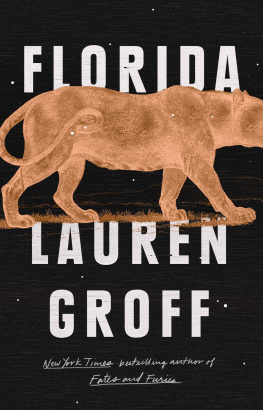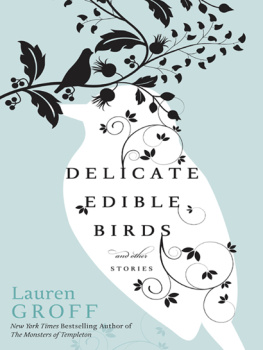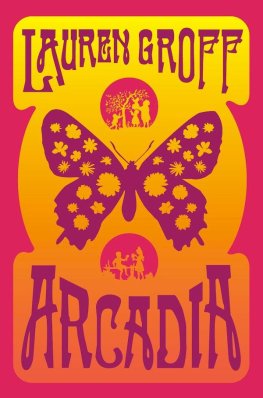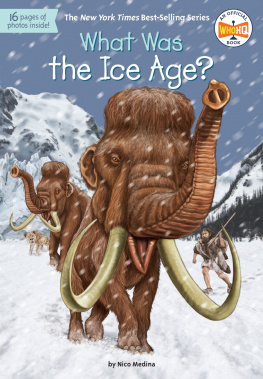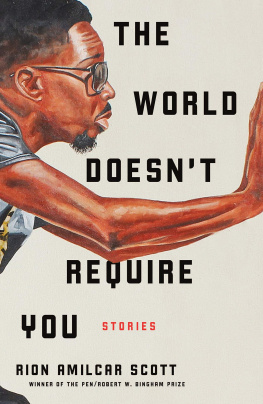ALSO BY LAUREN GROFF
Fates and Furies
Arcadia
Delicate Edible Birds
The Monsters of Templeton

RIVERHEAD BOOKS
An imprint of Penguin Random House LLC
375 Hudson Street
New York, New York 10014

Copyright 2018 by Lauren Groff
Penguin supports copyright. Copyright fuels creativity, encourages diverse voices, promotes free speech, and creates a vibrant culture. Thank you for buying an authorized edition of this book and for complying with copyright laws by not reproducing, scanning, or distributing any part of it in any form without permission. You are supporting writers and allowing Penguin to continue to publish books for every reader.
Thank you to the editors of the journals where these stories were first published: The New Yorker for Ghosts and Empties, Dogs Go Wolf, The Midnight Zone, Flower Hunters, and Above and Below; Five Points for At the Round Earths Imagined Corners; Subtropics for Eyewall; American Short Fiction for For the God of Love, for the Love of God; Tin House for Salvador; Esquire for Snake Stories; and Granta for an abridged version of Yport. Thank you to the editors of the anthologies Best American Short Stories (2014, 2016, and 2017), 100 Years of the Best American Short Stories, and The PEN/O. Henry Prize Stories (2012).
Library of Congress Cataloging-in-Publication Data
Names: Groff, Lauren, author.
Title: Florida / Lauren Groff.
Description: New York : Riverhead Books, 2018.
Identifiers: LCCN 2017042916| ISBN 9781594634512 (hardcover) | ISBN 9780698405141 (ebook)
Classification: LCC PS3607.R6344 A6 2018 | DDC 813/.6dc23
LC record available at https://lccn.loc.gov/2017042916
p. cm.
This is a work of fiction. Names, characters, places, and incidents either are the product of the authors imagination or are used fictitiously, and any resemblance to actual persons, living or dead, businesses, companies, events, or locales is entirely coincidental.
Version_1
For Heath
CONTENTS
GHOSTS AND EMPTIES
I have somehow become a woman who yells, and because I do not want to be a woman who yells, whose little children walk around with frozen, watchful faces, I have taken to lacing on my running shoes after dinner and going out into the twilit streets for a walk, leaving the undressing and sluicing and reading and singing and tucking in of the boys to my husband, a man who does not yell.
The neighborhood goes dark as I walk, and a second neighborhood unrolls atop the daytime one. We have few streetlights, and those I pass under make my shadow frolic; it lags behind me, gallops to my feet, gambols on ahead. The only other illumination is from the windows in the houses I pass and the moon that orders me to look up, look up! Feral cats dart underfoot, bird-of-paradise flowers poke out of the shadows, smells are exhaled into the air: oak dust, slime mold, camphor.
Northern Florida is cold in January and I walk fast for warmth but also because, though the neighborhood is antiquehuge Victorian houses radiating outward into 1920s bungalows, then mid-century modern ranches at the edgesits imperfectly safe. There was a rape a month ago, a jogger in her fifties pulled into the azaleas; and, a week ago, a pack of loose pit bulls ran down a mother with a baby in her stroller and mauled both, though not to death. Its not the dogs fault, its the owners fault! dog lovers shouted on the neighborhood email list, but those dogs were sociopaths. When the suburbs were built, in the seventies, the historic houses in the center of town were abandoned to graduate students who heated beans over Bunsen burners on the heart-pine floors and sliced apartments out of ballrooms. When neglect and humidity caused the houses to rot and droop and develop rusty scales, there was a second abandonment, to poor people, squatters. We moved here ten years ago because our house was cheap and had virgin-lumber bones, and because I decided that if I had to live in the South, with its boiled peanuts and its Spanish moss dangling like armpit hair, at least I wouldnt barricade myself with my whiteness in a gated community. Isnt it... dicey? people our parents age would say, grimacing, when we told them where we lived, and it took all my willpower not to say, Do you mean black, or just poor? Because it was both.
White middle-classness has since infected the neighborhood, though, and now everything is frenzied with renovation. In the past few years, the black people have mostly withdrawn. The homeless stayed for a while, because our neighborhood abuts Bo Diddley Plaza, where, until recently, churches handed out food and God, and where Occupy rolled in like a tide and claimed the right to sleep there, then grew tired of being dirty and rolled out, leaving behind a human flotsam of the homeless in sleeping bags. During our first months in the house, we hosted a homeless couple we only ever saw slinking off in the dawn: at dusk, they would silently lift off the latticework to the crawl space under our house and then sleep there, their roof our bedroom floor, and when we got up in the middle of the night, we tried to walk softly because it felt rude to step inches above the face of a dreaming person.
On my nighttime walks, the neighbors lives reveal themselves, the lit windows domestic aquariums. At times, Im the silent witness to fights that look like slow-dancing without music. It is astonishing how people live, the messes they sustain, the delicious whiffs of cooking that carry to the street, the holiday decorations that slowly seep into daily decor. All January, I watched a Christmas bouquet of roses on one mantel diminish until the flowers were a blighted shrivel and the water green scum, a huge Santa on a stick still beaming merrily out of the ruins. Window after window nears, freezes with its blue fog of television light or its couple hunched over a supper of pizza, holds as I pass, then slides into the forgotten. I think of the way water gathers as it slips down an icicles length, pauses to build its glossy drop, becomes too fat to hang on, plummets down.
There is one mostly windowless place in the neighborhood that I love nevertheless, because it houses nuns. There used to be six nuns there, but attrition happened, as it does with very old ladies, and now there are only three kindly sisters squeaking around that immense space in their sensible shoes. A realtor friend told us that when it was built in the 1950s, a bomb shelter was lowered into the porous limestone of the backyard, and during sleepless nights, when my body is in bed but my brain is still out walking in the dark, I like to imagine the nuns in full regalia in their shelter, singing hymns and spinning on a stationary bike to keep the lightbulb sputtering on, while, aboveground, all has been blasted black, and rusted hinges rasp the wind.
Because the nights are so cold, I share the streets with few people. Theres a young couple who jog at a pace slightly slower than my fast walk. I follow them, listening to their patter of wedding plans and fights with friends. Once I forgot myself and laughed at something they said and their faces owled, unnerved, back at me, then they trotted faster and took the first turn they found and I let them disappear into the black.

